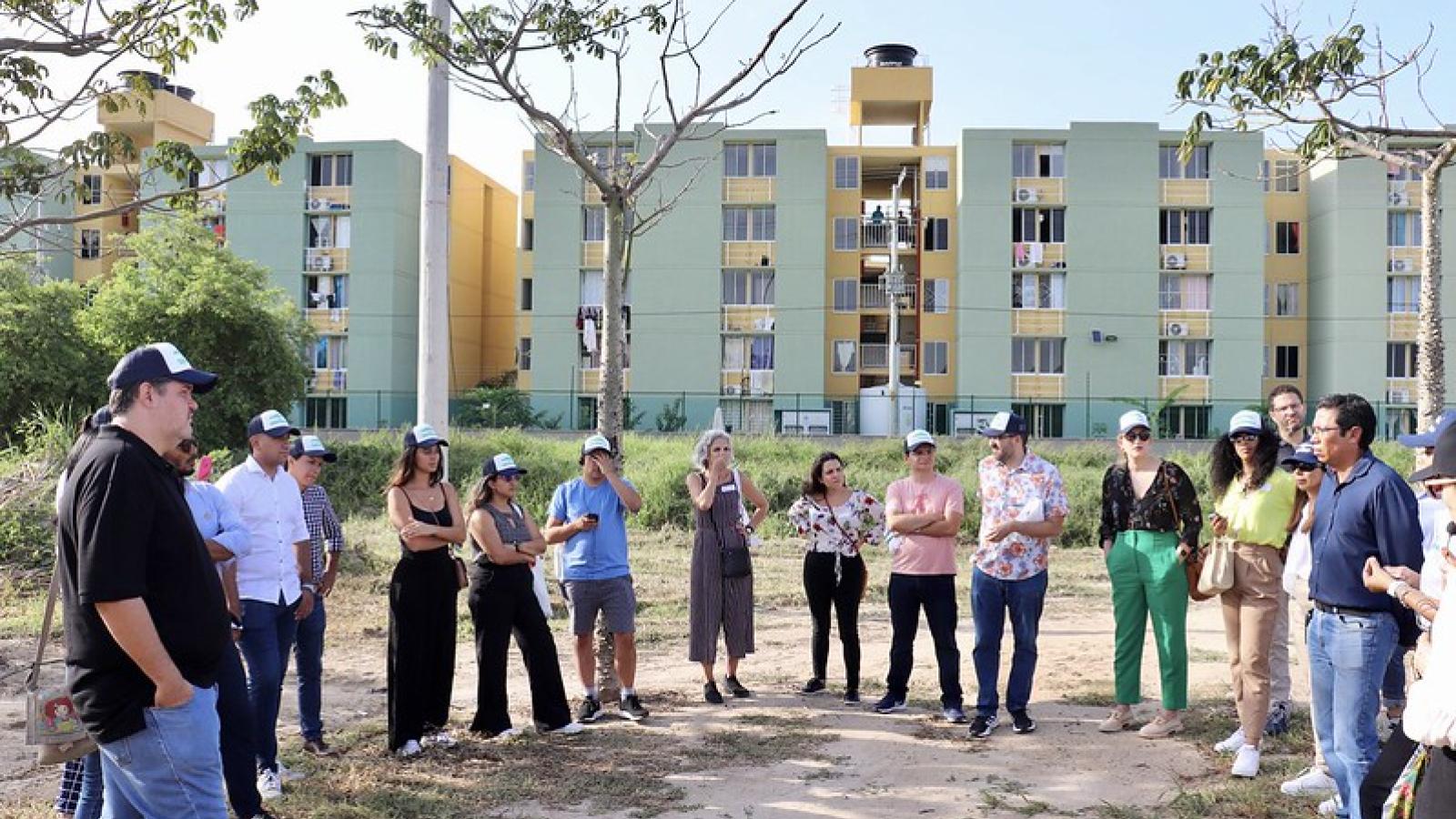City Spotlight
How Teresina is Accelerating its Transition to a Green and Resilient City
From UrbanShift's capacity-building activities, this scorching city in northeastern Brazil is drawing inspiration and technical knowledge to build sustainability from the ground up.
Martins and a group from Latin America touring Barranquilla's innovative parks program.
In 2024, in Teresina’s Lagoa do Mazerine, a linear park not far from the airport, a new garden opened to the public. For the community around the park, the new green space is a respite from the paved cityscape and the nearby industrial activity. But the garden’s purpose is even deeper than that. Designed as a rain garden, this green space absorbs excess water during downpours, chipping away at the region’s growing flood risk.
Teresina is the capital of Piauí, one of the most climate and economically vulnerable states in Brazil. According to the International Institute for Environment and Development, Teresina ranks among the world’s hottest cities. As temperatures continue to rise and threaten the agricultural industries that surround the city, Teresina is bracing for an influx of migration from the more rural parts of the state. For Teresina, the climate crisis has arrived. But the city is wasting no time responding. Teresina’s 2030 Agenda aims to align the city’s policies with the climate goals laid out by the Paris Agreement and to build climate resilience across the city, particularly for the most vulnerable residents.
Leonardo Madeira Martins coordinates the 2030 Agenda for Teresina. A career public servant, he works as an environmental analyst for the city. In his capacity as the 2030 Agenda coordinator, Martins is responsible for leading a team to generate and implement ideas for how Teresina can strengthen its climate action policies, and how it can bring these ideas to local, national, and international partners for support.
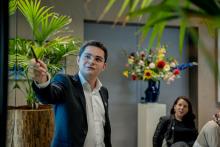
In Brazil, UrbanShift has supported Teresina, along with Belém and Florianópolis, for the past five years through the CITinova II project, which is funded by the Global Environment Facility and executed by the Brazilian Ministry of Science, Technology, and Innovation. UrbanShfit’s work with this cohort of Brazilian cities has emphasized the value of integrated and sustainable planning approaches that can build urban resilience, reduce greenhouse gases, and support nature and biodiversity. “For Teresina, the training component of the UrbanShift platform was extremely important,” Martins said. “Whenever we had an opportunity to participate in a training, we always shared our learnings back with the team and developed working groups around how to implement them.”
One of those ideas was the rain garden. In July of 2023, Martins and some of his colleagues from Teresina traveled to Barranquilla, Colombia as part of an UrbanShift Peer-to-Peer Exchange on urban nature-based solutions. Exploring Barranquilla’s award-winning Todos al Parque program, which ensures 93% of households can walk to a park or green space in eight minutes or less, gave the Teresina delegation some ideas. Not only do Barranquilla’s parks improve quality of life for residents—they do double duty as climate resilience infrastructure that lowers temperatures and reduces flood risk. “At the time of this exchange with Barranquilla, we were working on a greening plan for Teresina,” Martins said. “The Todos al Parque project greatly influenced how we developed the plan.”
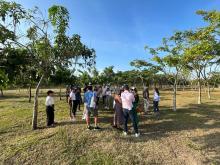
Alongside the greening plan, Teresina was also developing its overarching Climate Action Plan in 2023. Just weeks before the Barranquilla event, Martins had traveled to San José, Costa Rica to participate in an UrbanShift City Academy on Integrated Climate Action Planning. Working on the two plans simultaneously and with the insights from the UrbanShift events, Martins said, enabled Teresina to ensure that plans were complementary of each other and oriented toward shared goals. The Integrated Climate Action Planning course, he added, accelerated the city’s progress on its Climate Action Plan, which launched in October 2023. Following the City Academy, Martins connected with Matheus Ortega of C40, who led the course and subsequently delivered a master class to the parliamentary body of Teresina on how to strengthen its plan to mitigate climate impacts and boost resilience. C40 and UrbanShift supported Teresina to create a poster that synthesized the key actions laid out in the plan for the public. “This helped us succinctly communicate the challenges that Teresa would face going forward and how the plan would address them,” Martins said, adding that two years later, the city is still using the poster to inform the public about how its addressing climate change.
The thematic support on urban greening and climate action that Martins and the Teresina delegation received through UrbanShift “allowed us to take more ownership over these issues and develop actionable plans,” he said. UrbanShift has also supported Teresina to connect with meaningful financial support to bring its climate resilience plans to life.
Through participating in an UrbanShift Finance Academy in São Paulo, Brazil in August 2023, Martins and colleagues from cities across Brazil were able to connect with financers like the City Climate Finance Gap Fund to learn about best practices for attracting funds for adaptation and resilience projects. “That was eye-opening for us,” Martins said. “I have a background in international credit operations, so I was familiar with working with banks, but I hadn’t been aware of the possibility of applying to a fund before the UrbanShift event.” With the advice and insight from the Finance Academy, Teresina has successfully secured funding from the United Nations Population Fund for a research project into the impacts of extreme heat on pregnancy outcomes for Afro-descendent and pardo women in the city. Following the Finance Academy, Teresina also secured Light-Touch Technical Assistance support from UrbanShift and C40 to overcome financing barriers to developing urban drainage and regeneration projects.
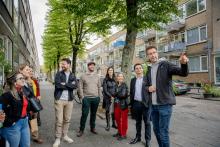
Over the past five years, Martins said, “we have tried to absorb as many opportunities and insights as we could from UrbanShift.” While UrbanShift is concluding in 2025, its partnership with Teresina will continue to shape the city and its resilience actions for years to come. Martins and his team are using the expertise they’ve gained through events like the Finance Academy to pursue funding opportunities for Teresina. Recently, the city entered the Bloomberg Mayor’s Challenge for an opportunity to reimagine core service delivery in Teresina. From a Peer-to-Peer Exchange that Teresina participated in in Rotterdam in September 2024, the city returned home with concepts for rooftop solar and greening approaches that they are aiming to scale up.
The opportunity to visit peer cities and witness solutions in action, Martins said, has offered Teresina invaluable insights and ideas for how to tackle their own challenges, from heat to flooding. “Cities are all facing very difficult problems,” Martins said. “What I’ve gathered from UrbanShift is that we don’t need to tackle them alone." And when it comes to making tangible progress on climate action, "we can’t be shy about asking for support or partnership,” he said. “Cities are stronger when we act together.”
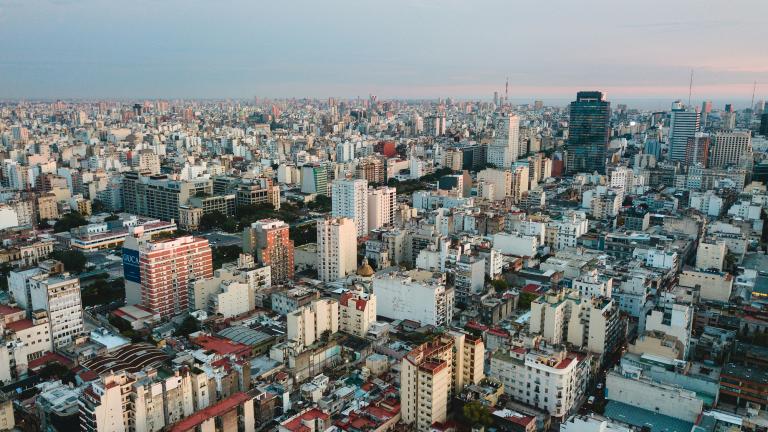
What's Next for the UrbanShift Network?
As the UrbanShift Global Platform concludes, the next phase of the GEF Sustainable Cities Impact Program will build on the momentum and progress for sustainable and resilient cities.
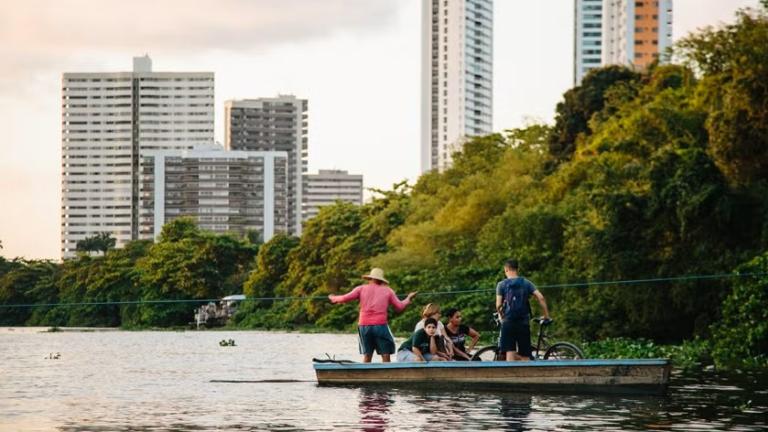
Resilient Infrastructure in Brazil's Cities Grows from the Roots
How cities from Recife to Belém are pursuing innovative green strategies with the support of the Global Environment Facility.
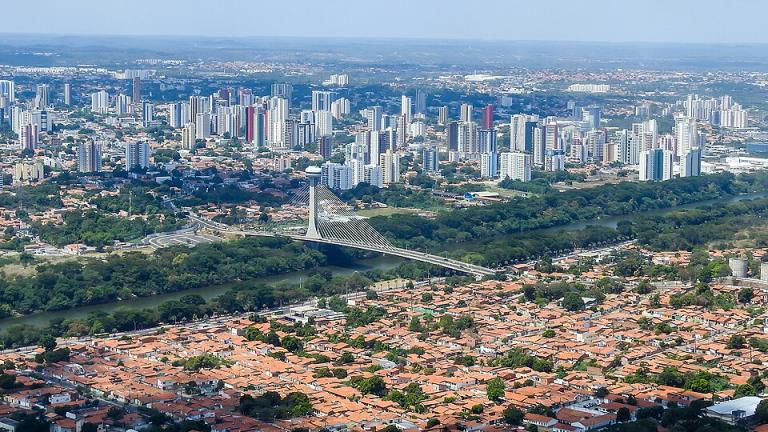
City-Business Accelerator (CiBiX) workshop in Teresina
The workshop will focus on addressing the critical issue of extreme heat in the city of Teresina, Brazil.
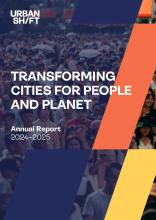
UrbanShift Annual Report 2024-2025
UrbanShift's final Annual Report spans an impactful year of over 30 events and major progress across our network of 23 cities.
